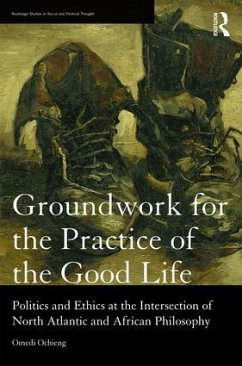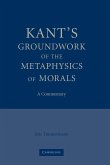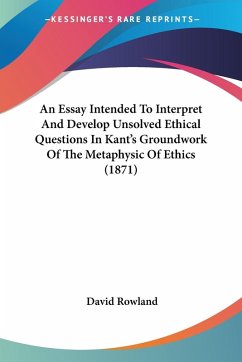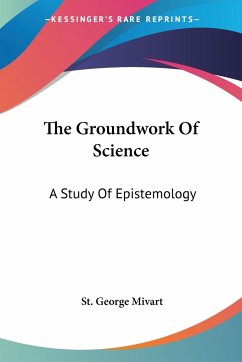Omedi Ochieng
Groundwork for the Practice of the Good Life
Politics and Ethics at the Intersection of North Atlantic and African Philosophy
Omedi Ochieng
Groundwork for the Practice of the Good Life
Politics and Ethics at the Intersection of North Atlantic and African Philosophy
- Gebundenes Buch
- Merkliste
- Auf die Merkliste
- Bewerten Bewerten
- Teilen
- Produkt teilen
- Produkterinnerung
- Produkterinnerung
This book articulates a radically original account of what constitutes the good society and the good life in a global world. Beginning with a relentlessly searching critique of canonical texts in the North Atlantic and African philosophical traditions, it culminates in a luminous vision of what it means to live well in the twenty-first century.
Andere Kunden interessierten sich auch für
![Kant's Groundwork of the Metaphysics of Morals Kant's Groundwork of the Metaphysics of Morals]() TimmermannKant's Groundwork of the Metaphysics of Morals47,99 €
TimmermannKant's Groundwork of the Metaphysics of Morals47,99 €![An Essay Intended To Interpret And Develop Unsolved Ethical Questions In Kant's Groundwork Of The Metaphysic Of Ethics (1871) An Essay Intended To Interpret And Develop Unsolved Ethical Questions In Kant's Groundwork Of The Metaphysic Of Ethics (1871)]() David RowlandAn Essay Intended To Interpret And Develop Unsolved Ethical Questions In Kant's Groundwork Of The Metaphysic Of Ethics (1871)20,99 €
David RowlandAn Essay Intended To Interpret And Develop Unsolved Ethical Questions In Kant's Groundwork Of The Metaphysic Of Ethics (1871)20,99 €![The Groundwork Of Science The Groundwork Of Science]() St. George MivartThe Groundwork Of Science33,99 €
St. George MivartThe Groundwork Of Science33,99 €![Kant's Groundwork of the Metaphysics of Morals Kant's Groundwork of the Metaphysics of Morals]() Paul GuyerKant's Groundwork of the Metaphysics of Morals172,99 €
Paul GuyerKant's Groundwork of the Metaphysics of Morals172,99 €![Groundwork of the Metaphysics of Morals Groundwork of the Metaphysics of Morals]() Immanuel KantGroundwork of the Metaphysics of Morals95,99 €
Immanuel KantGroundwork of the Metaphysics of Morals95,99 €![The Good Life in a Technological Age The Good Life in a Technological Age]() The Good Life in a Technological Age76,99 €
The Good Life in a Technological Age76,99 €![The Good Life in a Technological Age The Good Life in a Technological Age]() The Good Life in a Technological Age206,99 €
The Good Life in a Technological Age206,99 €-
-
-
This book articulates a radically original account of what constitutes the good society and the good life in a global world. Beginning with a relentlessly searching critique of canonical texts in the North Atlantic and African philosophical traditions, it culminates in a luminous vision of what it means to live well in the twenty-first century.
Hinweis: Dieser Artikel kann nur an eine deutsche Lieferadresse ausgeliefert werden.
Hinweis: Dieser Artikel kann nur an eine deutsche Lieferadresse ausgeliefert werden.
Produktdetails
- Produktdetails
- Verlag: Routledge
- Seitenzahl: 286
- Erscheinungstermin: 20. Oktober 2016
- Englisch
- Abmessung: 235mm x 157mm x 20mm
- Gewicht: 568g
- ISBN-13: 9781138204393
- ISBN-10: 1138204390
- Artikelnr.: 47127404
- Herstellerkennzeichnung
- Libri GmbH
- Europaallee 1
- 36244 Bad Hersfeld
- gpsr@libri.de
- Verlag: Routledge
- Seitenzahl: 286
- Erscheinungstermin: 20. Oktober 2016
- Englisch
- Abmessung: 235mm x 157mm x 20mm
- Gewicht: 568g
- ISBN-13: 9781138204393
- ISBN-10: 1138204390
- Artikelnr.: 47127404
- Herstellerkennzeichnung
- Libri GmbH
- Europaallee 1
- 36244 Bad Hersfeld
- gpsr@libri.de
Dr. Omedi Ochieng is an Assistant Professor of Communication at Denison University. His areas of specialization include the rhetoric of philosophy; comparative philosophy; and social theory. He has published articles in the International Philosophical Quarterly, Radical Philosophy, and the Western Journal of Communication.
Introduction: Groundwork for the Infraphysics of Practice: The Good Society
and the Good Life in North Atlantic and African Philosophy
Part I: "Think Relationally, Act Structurally": A Social Ontology of the
Good Society
1. Introduction
2. Mapping Social Ontology
2.1. Social Structure
2.1.1. Politics
2.1.2. Economics
2.1.3. Culture
2.2 Subjectivity and Relationality
2.3 Power, Legitimation and Ideology
2.3.1. Power
2.3.2. Representation
2.3.3. Relationships
2.3.4. Consciousness
2.4. Agency
2.5. Normativity
3. Dimensions and Vectors of The Good Society
3.1. Interanimated Historiography
3.2. Chronotopian Political Imagination
3.3. Secular/Naturalistic Structures
3.4. Restructurative Justice
4. Conclusion
Part II: Chronotopes: Archaeologies and Landscapes of the Good Society
1. Introduction
2. Contextualizing African Identity
3. African Political Structures
3.1. Auto-politics
3.2. Inter-politics
3.3. Pneuma/Theo-politics
3.4. Meta-politics
3.5. Anti-politics
3.6. Dia-politics
3.7. Ethno-politics
3.8. A-politics/Post-politics
3.9. Endo-politics
3.10. Poly-politics
4. Conclusion
Part III: Creaturely Value: A Meta-Ethics of the Good Life
1. Introduction
2. The Epistemology of Ethics
3. Mapping an Ontology of Ethics
3.1. Contextual Creatureliness
3.2. Toward a Critique of Dominant Ethical Theories
4. Conclusion
Part IV: Emergent Normativity: The Good Life as the Articulation of Ground
Projects
1. Introduction
2.1 Ground Projects as World-Articulations
2.2. Ground Projects as Self-Articulations
2.3. Ground Projects as Knowledge-Articulations
2.3.1. Ground Projects as a Praxis of World Knowledge
2.3.2. Ground Projects as a Praxis of Self Knowledge
2.3.3. Ground Projects as a Praxis of Imagination
2.4. Ground Projects as Meaning Articulations
3. Embodiments of the Ethical
3.1 The Hero
3.2 The Saint
3.3 The Citizen
4. Conclusion
Conclusion: The Owl of Minerva at Noon: Imagining Good Societies and Good
Lives
and the Good Life in North Atlantic and African Philosophy
Part I: "Think Relationally, Act Structurally": A Social Ontology of the
Good Society
1. Introduction
2. Mapping Social Ontology
2.1. Social Structure
2.1.1. Politics
2.1.2. Economics
2.1.3. Culture
2.2 Subjectivity and Relationality
2.3 Power, Legitimation and Ideology
2.3.1. Power
2.3.2. Representation
2.3.3. Relationships
2.3.4. Consciousness
2.4. Agency
2.5. Normativity
3. Dimensions and Vectors of The Good Society
3.1. Interanimated Historiography
3.2. Chronotopian Political Imagination
3.3. Secular/Naturalistic Structures
3.4. Restructurative Justice
4. Conclusion
Part II: Chronotopes: Archaeologies and Landscapes of the Good Society
1. Introduction
2. Contextualizing African Identity
3. African Political Structures
3.1. Auto-politics
3.2. Inter-politics
3.3. Pneuma/Theo-politics
3.4. Meta-politics
3.5. Anti-politics
3.6. Dia-politics
3.7. Ethno-politics
3.8. A-politics/Post-politics
3.9. Endo-politics
3.10. Poly-politics
4. Conclusion
Part III: Creaturely Value: A Meta-Ethics of the Good Life
1. Introduction
2. The Epistemology of Ethics
3. Mapping an Ontology of Ethics
3.1. Contextual Creatureliness
3.2. Toward a Critique of Dominant Ethical Theories
4. Conclusion
Part IV: Emergent Normativity: The Good Life as the Articulation of Ground
Projects
1. Introduction
2.1 Ground Projects as World-Articulations
2.2. Ground Projects as Self-Articulations
2.3. Ground Projects as Knowledge-Articulations
2.3.1. Ground Projects as a Praxis of World Knowledge
2.3.2. Ground Projects as a Praxis of Self Knowledge
2.3.3. Ground Projects as a Praxis of Imagination
2.4. Ground Projects as Meaning Articulations
3. Embodiments of the Ethical
3.1 The Hero
3.2 The Saint
3.3 The Citizen
4. Conclusion
Conclusion: The Owl of Minerva at Noon: Imagining Good Societies and Good
Lives
Introduction: Groundwork for the Infraphysics of Practice: The Good Society
and the Good Life in North Atlantic and African Philosophy
Part I: "Think Relationally, Act Structurally": A Social Ontology of the
Good Society
1. Introduction
2. Mapping Social Ontology
2.1. Social Structure
2.1.1. Politics
2.1.2. Economics
2.1.3. Culture
2.2 Subjectivity and Relationality
2.3 Power, Legitimation and Ideology
2.3.1. Power
2.3.2. Representation
2.3.3. Relationships
2.3.4. Consciousness
2.4. Agency
2.5. Normativity
3. Dimensions and Vectors of The Good Society
3.1. Interanimated Historiography
3.2. Chronotopian Political Imagination
3.3. Secular/Naturalistic Structures
3.4. Restructurative Justice
4. Conclusion
Part II: Chronotopes: Archaeologies and Landscapes of the Good Society
1. Introduction
2. Contextualizing African Identity
3. African Political Structures
3.1. Auto-politics
3.2. Inter-politics
3.3. Pneuma/Theo-politics
3.4. Meta-politics
3.5. Anti-politics
3.6. Dia-politics
3.7. Ethno-politics
3.8. A-politics/Post-politics
3.9. Endo-politics
3.10. Poly-politics
4. Conclusion
Part III: Creaturely Value: A Meta-Ethics of the Good Life
1. Introduction
2. The Epistemology of Ethics
3. Mapping an Ontology of Ethics
3.1. Contextual Creatureliness
3.2. Toward a Critique of Dominant Ethical Theories
4. Conclusion
Part IV: Emergent Normativity: The Good Life as the Articulation of Ground
Projects
1. Introduction
2.1 Ground Projects as World-Articulations
2.2. Ground Projects as Self-Articulations
2.3. Ground Projects as Knowledge-Articulations
2.3.1. Ground Projects as a Praxis of World Knowledge
2.3.2. Ground Projects as a Praxis of Self Knowledge
2.3.3. Ground Projects as a Praxis of Imagination
2.4. Ground Projects as Meaning Articulations
3. Embodiments of the Ethical
3.1 The Hero
3.2 The Saint
3.3 The Citizen
4. Conclusion
Conclusion: The Owl of Minerva at Noon: Imagining Good Societies and Good
Lives
and the Good Life in North Atlantic and African Philosophy
Part I: "Think Relationally, Act Structurally": A Social Ontology of the
Good Society
1. Introduction
2. Mapping Social Ontology
2.1. Social Structure
2.1.1. Politics
2.1.2. Economics
2.1.3. Culture
2.2 Subjectivity and Relationality
2.3 Power, Legitimation and Ideology
2.3.1. Power
2.3.2. Representation
2.3.3. Relationships
2.3.4. Consciousness
2.4. Agency
2.5. Normativity
3. Dimensions and Vectors of The Good Society
3.1. Interanimated Historiography
3.2. Chronotopian Political Imagination
3.3. Secular/Naturalistic Structures
3.4. Restructurative Justice
4. Conclusion
Part II: Chronotopes: Archaeologies and Landscapes of the Good Society
1. Introduction
2. Contextualizing African Identity
3. African Political Structures
3.1. Auto-politics
3.2. Inter-politics
3.3. Pneuma/Theo-politics
3.4. Meta-politics
3.5. Anti-politics
3.6. Dia-politics
3.7. Ethno-politics
3.8. A-politics/Post-politics
3.9. Endo-politics
3.10. Poly-politics
4. Conclusion
Part III: Creaturely Value: A Meta-Ethics of the Good Life
1. Introduction
2. The Epistemology of Ethics
3. Mapping an Ontology of Ethics
3.1. Contextual Creatureliness
3.2. Toward a Critique of Dominant Ethical Theories
4. Conclusion
Part IV: Emergent Normativity: The Good Life as the Articulation of Ground
Projects
1. Introduction
2.1 Ground Projects as World-Articulations
2.2. Ground Projects as Self-Articulations
2.3. Ground Projects as Knowledge-Articulations
2.3.1. Ground Projects as a Praxis of World Knowledge
2.3.2. Ground Projects as a Praxis of Self Knowledge
2.3.3. Ground Projects as a Praxis of Imagination
2.4. Ground Projects as Meaning Articulations
3. Embodiments of the Ethical
3.1 The Hero
3.2 The Saint
3.3 The Citizen
4. Conclusion
Conclusion: The Owl of Minerva at Noon: Imagining Good Societies and Good
Lives








